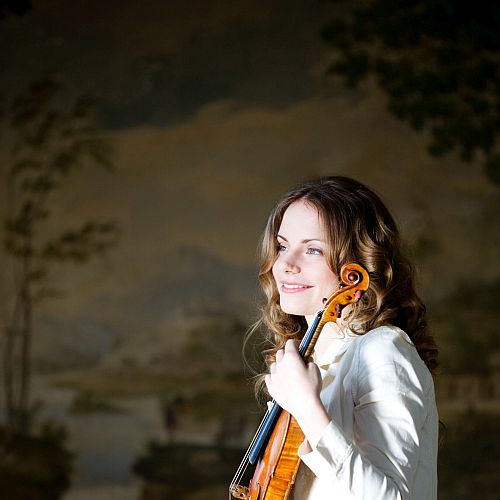 Switzerland Haydn, Mendelssohn and Schoenberg: Academy of St. Martin-in-the-Fields, Julia Fischer (violin) Oliver Schnyder (piano), Tonhalle Zurich 21.4.15 (JR)
Switzerland Haydn, Mendelssohn and Schoenberg: Academy of St. Martin-in-the-Fields, Julia Fischer (violin) Oliver Schnyder (piano), Tonhalle Zurich 21.4.15 (JR)

Haydn: Concerto for violin and strings in G major
Mendelssohn: Double concerto for violin and piano in D minor
Schoenberg: “Verklärte Nacht”
The venerable Academy is touring Switzerland this month, with assistance from Swiss retailer Migros, with concerts in St. Gallen, Geneva and Zurich. At 91, Sir Neville Marriner, who set up this orchestra some 50 years ago, can no longer be at the helm, though I read he still occasionally conducts! The German violinist Julia Fischer was at the controls for this concert, a star in her own right of course.
The first half of the concert was “old school”, a Haydn concerto which musicologists cannot date but seemingly pre-Esterházy. One was immediately struck by the crisp, characterful and precise playing from the members of the Academy and the effortless playing by Julia Fischer. The final movement required an injection of passion, which Fischer duly gave; the programme note spoke of bagpipe effects but, hard as I listened, I missed them. It all made for an enjoyable start to this concert.
Then followed some very early Mendelssohn; he wrote his double concerto for piano and violin at the tender age of 14. Mendelssohn himself was at the piano at the first performance, in his parents’ home, and his violin teacher, Eduard Ritz, himself only 21, was the violinist. The piece just showed us what a prodigy Mendelssohn must have been, the piano part was by no means simple, the composition quite masterly. The first movement has some entertaining Keystone Cops elements on the piano which brought a smile to many a face, and some gypsy or possibly Jewish themes for the violin. In the slow movement, most of the focus is on the soloists and Fischer and Schnyder were very much in tandem. The final movement shows Mendelssohn displaying a remarkable degree of musical maturity with many passages of considerable beauty. It is surprising that the work, after its first performances, fell into complete obscurity until after the Second World War.
As a first-half encore we were treated by the soloists to the spectacular and fizzing Finale from Saint-Saens’ Sonata in D minor.
Sadly, quite a few concertgoers – including, sadly, youngsters – decided to leave the concert at that stage, thinking perhaps that a diet of Schoenberg in the second half might be unpalatable. I am sure they had no idea that Verklärte Nacht is a great work of wonder and completely tonal to boot – they should have stayed. It was the highlight of the evening. One can envisage the booing and fighting which occurred on its first performance, back in 1902. Originally written for string sextet, Schoenberg went on to re-write it (and then revise it at some time later) for chamber orchestra. The players revelled in the chromaticism and counterpoint, Julia Fischer taking the Leader’s chair. One watched the principals closely following each other’s lead to ensure pinpoint ensemble. The tone of the principal viola and principal cello was remarkable. The performance could not be faulted, though by the end my elderly neighbour had nodded off and coughing was sadly much in evidence – it is evidently still not an easy work for some.
John Rhodes
